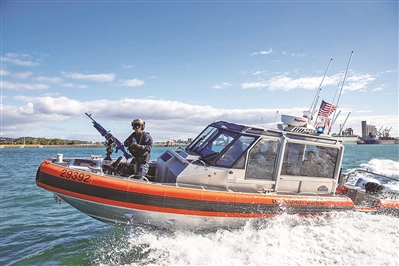By Li Lun and Liu Hujun

US Coast Guard in a joint military exercise with Australia
Foreign media reported that the US has signed a new defense agreement with Palau that allows the US Coast Guard to carry out maritime law enforcement unilaterally in Palau's exclusive economic zone, including boarding ships of other nationalities for search in the absence of Palau's law enforcement personnel. The news has caused an uproar.
The US has signed the "shiprider agreement" with several Pacific Islands Countries including the Federated States of Micronesia and Papua New Guinea since the end of 2022. By the end of July this year, it had signed the agreement with 12 countries in the region and carried out maritime patrol in nine of them. It is not uncommon for the US Coast Guard, leveraging its military superiority, to interfere in other countries’ internal affairs on the pretext of helping them combat illegal fishing and crimes on the sea, which has kept worsening the regional security environment.
Since the "Indo-Pacific strategy" was officially put forth in 2017, America has shifted its strategic priority to the Asia Pacific with a particular emphasis on disputed waters and sea routes of strategic significance. To assist in the US Navy's operations, its Coast Guard has released a strategic plan along with more frequent, larger-scale and much-escalated operations in Asian Pacific waters.
It is previously reported that the US Coast Guard will make regular deployments in places like Guam, Hawaii and American Samoa, and will strengthen cooperation with its counterparts in Vietnam and the Philippines to jointly serve America's "Indo-Pacific strategy" alongside the US Navy. Moreover, the Coast Guard has submitted a proposal to Congress requesting the upgrading and modernization of its equipment that would cost a total of US$1.57 billion, in the endeavor to enhance its combat capabilities so that it is able to perform more complicated missions in the Asia Pacific.
Against such a background, the US Coast Guard has taken a series of moves in order to play its role as an important supplement to the US Navy in the region, not only carrying out a number of maritime security missions in Asian Pacific waters but also participating in bilateral or multilateral maritime military exercises as a sentry alongside the US Navy.
The US has its own calculations for expanding the Coast Guard activities in the Asia Pacific. Some regional countries find it hard to accept – even publicly oppose – the "freedom of navigation" operations by the US Navy and therefore unwilling to collaborate with it in other domains. The activities by the Coast Guard will tone down the military nature to some extent. However, despite the high frequency, the Coast Guard's activities are a far cry from catching up with the Navy.
First, its equipment commissioning is too slow in the Asia Pacific. The US Coast Guard faces the triple whammy of insufficient vessels, inadequate capital, and backward infrastructure. Even if all the equipment on the list it submitted to Congress is delivered on time, its shortfall won't be improved fundamentally, not to mention how challenging it will be for it to perform missions when logistics and repair services lag behind.
Second, its activities still assume a strong military vibe. A US military officer said the Coast Guard is best positioned both militarily and diplomatically, but at the end of the day, it is an armed force after all and its activities in Asian Pacific waters are still a form of military operation, which is the reason for some regional countries' concerns and reservations when engaging with it.













